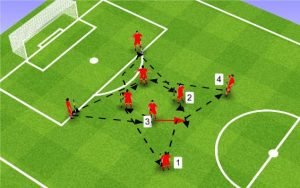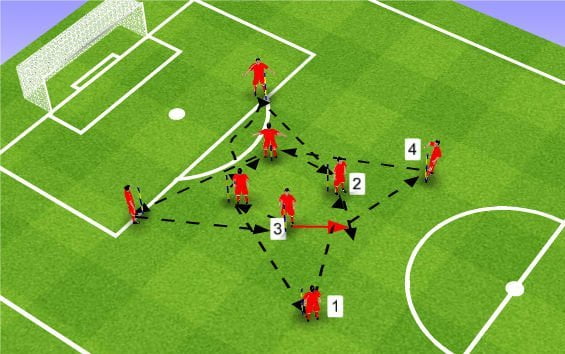 “Tiki-Taka” is the latest phrase used to describe how the game is played by the Spanish national
“Tiki-Taka” is the latest phrase used to describe how the game is played by the Spanish national
“Tiki-Taka” is the Spanish term for clackers, a pair of balls on a string which swung up and down so they banded together, making click-clacking noises or, as the Spanish say, “tiki-taka.” Andrés Montes, the Spanish commentator for the 2006 World Cup 2006, is attributed with having been the first to use this phrase for
Tiki-taka is easy to describe: it’s a fast passing game, started if at all possible upon the first contact with the ball, and then straight into the goal. The opposing team finds itself running after the ball constantly and gets worn down by the action.
Training Tiki-Taka
We know from FC Barcelona that children up the age of 12 are always playing 4-on-4. This type of game promotes short passing and automatic triangular formations. All players are constantly involved in both offense and defense.
In Germany, this style of playing has also become familiar and has been promoted as the “small game.” This “small game” is the cornerstone of Tiki-Taka and there have been calls to add 4-on-4 tournaments to the official game schedules. The Dutch have also placed a lot of emphasis on 4-on-4 play in their practice training since the mid-1980’s.
In Spain, Tiki-Taka is seen as a new game with origins in five-a-side
Triangular play, fast tempo, short reaction times, always being ready to be passed
to–all of these have been brought to the field by five-a-side
If the basic tactical formation in a team of four is 1-2-1, then that is already the diamond or rhombus shape with its standard passing positions and the ability to play the ball into the deep.
Training Exercise for Tiki-Taka
We don’t want to close this article without giving you a practice formation typically used by Barcelona:
It’s quite easy: play 2 against 2, 3 against 3, or 4 against 4 without goals. What you’ll find is that not just one game will be played, but three, four, or even more. Everybody plays in a single, limited field and it’s not only the opponent but also the players in other pairings who cause interference in Tiki-Taka.
